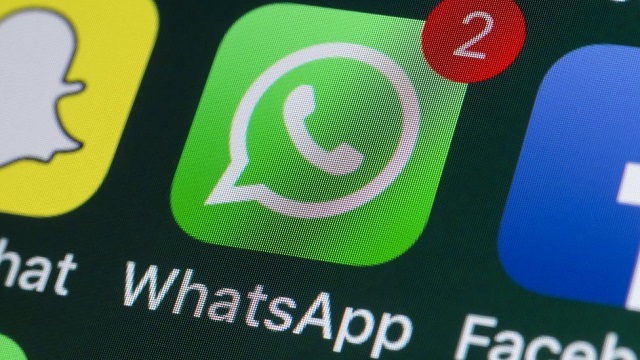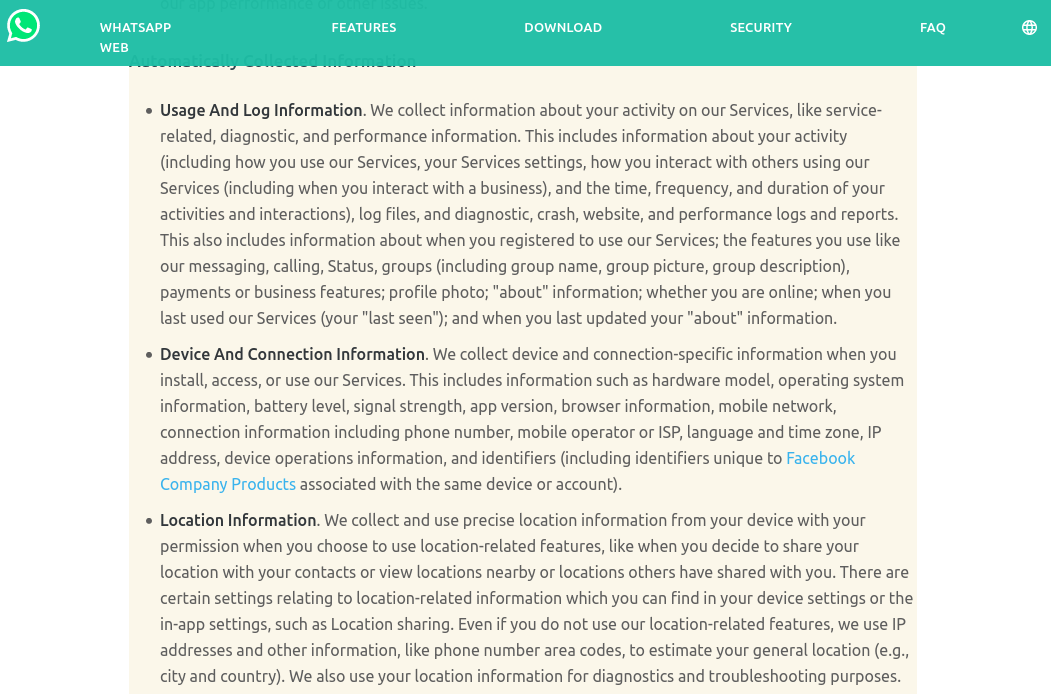Why you should leave WhatsApp, and how Comment
Editor's Desk, New in Ceasefire - Posted on Sunday, January 10, 2021 15:06 - 0 Comments
By Usayd Younis

This week WhatsApp, a subsidiary of Facebook since 2014, told its two billion users they had to agree to their new terms of service. Perhaps to their surprise, people have been less dismissive of the notice than Facebook might like, despite the fact that WhatsApp has in fact been sharing user data with Facebook since 2016. The new user agreement details some of the extensive data sharing between WhatsApp and Facebook, and whilst GDPR prevents some data sharing in the EU, a cursory look is enough to show that WhatsApp is already collecting a disturbing amount of our personal information.
Whilst actual conversation data is encrypted (according to WhatsApp), the application still collects vast amounts of identifying metadata — including information about contacts, location data and even battery life. Facebook makes its profits from advertising, and their trove of user information, now tied to conversational behaviours from WhatsApp and Facebook Messenger, make for a very lucrative product.
If you’re still sceptical, consider that both of WhatsApp’s founders left the organisation after it was acquired by Facebook — one to start a rival service centred on user privacy (Signal), while the other quit “over Facebook’s attempts to use its personal data and weaken its encryption”. If the very people who made WhatsApp’s software don’t trust it, neither should we.
As journalist Glenn Greenwald discusses in his TED talk ‘Why Privacy Matters‘, you don’t have to be engaged in nefarious activity to care about whether your privacy is being violated. Perhaps more crucially, by being the weakest link in the chain, you could inadvertently be putting others at risk.
I’m convinced, what next?
It’s important to note that without encryption, messages and calls can be intercepted and collected en masse. This was exposed by Edward Snowden, a former NSA agent who leaked extensive information on global surveillance and revealed just how pernicious State actors can be when it comes to spying on their own citizens. Snowden recommended that people use Signal, so that’s a good place to start.
Signal* is an open-source app which, like WhatsApp, offers encrypted messaging (and calls). Unlike WhatsApp, however, Signal is audited and operated by a non-profit organisation. I have used Signal for years, albeit to communicate with precisely one other person. With a huge influx of users of late, I’m finally seeing some of my other contacts moving over to the platform and I am now taking advantage of the opportunity to encourage others to follow suit.
Surely privacy is a losing battle?
There are plenty of reasons why people are sceptical of chasing the ideal of privacy. The biggest is simply the challenge of convincing others to join; facing resistance from friends and family who simply aren’t interested in installing yet another app. Others make the argument that the battle has already been lost: surely Facebook (and Google, and Amazon etc) already have all my information by now? Some go as far as to say that sacrificing privacy is a price worth paying for ease and convenience.
Whilst all of these arguments can be countered, I advocate for a more straightforward approach to managing privacy online: Do what you can, but do something. For instance, I started de-googling (yes, this is a thing) over a year ago and still can’t claim to have wrought myself free of Google’s services. Yet I feel reassured knowing I am handing over far less information to them than I was before. With WhatsApp giving you until 8th February to ‘agree’ to its new terms, now is a good opportunity to shift a few of your important conversations to a platform that is much clearer about how it processes your data.

Excerpt from Whatsapp’s latest user agreement terms
What about everything else?
There is a lot more you can do — and a great place to start is PrivacyTools.io, a website which offers privacy-respecting alternatives to many of the tools that you currently use, from Google Drive to Windows.
What if the ‘price worth paying’ is actually just paying for the service? An easy win here is email. Moving to a new email provider can seem like a huge effort, but in my experience the biggest hurdle was just making the decision to go ahead and do it. Moving your calendar and contacts can be equally straightforward. Whilst you’re at it, why not delete the social media apps on your phone and use your web browser to interact with them instead? Not only does this reduce how addictive they are, it also makes them less effective at tracking your behaviours (read: less). These steps could be taken with the view to removing yourself from these platforms entirely in the longer run.
With the growing global interest in online data privacy, there is plenty of help available (and feel free to get in touch). Beyond trying to protect yourself from preying advertisers, advocating for greater respect for our privacy can not only be a radical act, it can also help defend those most vulnerable online.



Leave a Reply